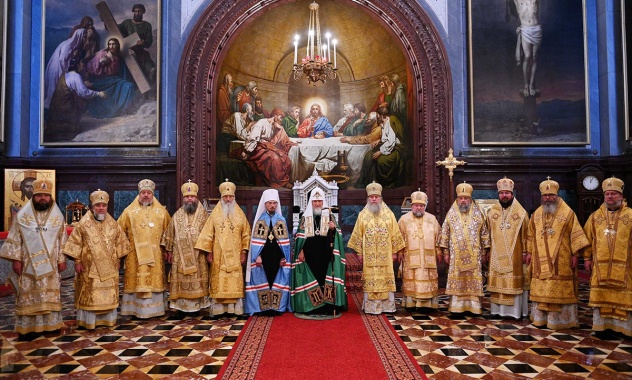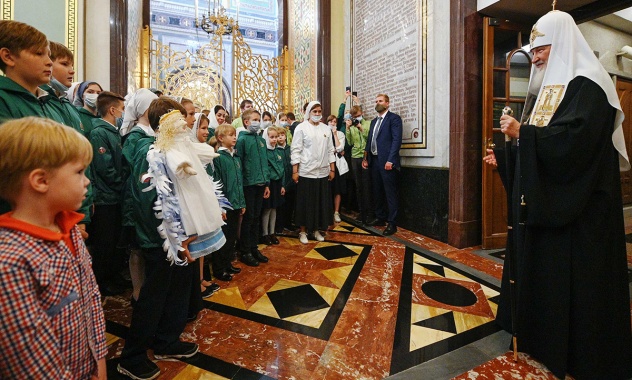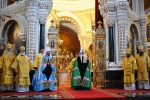Primate of the Russian Church celebrates Divine Liturgy at Cathedral of Christ the Saviour on commemoration day of St. Peter the Metropolitan of Moscow
On 6th September 2020, 13th Sunday after Pentecost, feast day of the Synaxis of the Moscow Saints (movable feast celebrated on Sunday before 26th August) and commemoration day of the translation of the holy relics of St. Peter the Metropolitan of Kiev, Moscow and All Russia and Wonderworker, His Holiness Patriarch Kirill of Moscow and All Russia officiated at the Divine Liturgy in the Cathedral of Christ the Saviour in Moscow.
Concelebrating with His Holiness Patriarch Kirill was an assembly of hierarchs and clergymen of the Russian Orthodox Church.
Among those who participated in the divine service, during which His Holiness elevated His Grace Veniamin, newly elected Metropolitan of Minsk and Zaslavl, Patriarchal Exarch of All Belarus, to the rank of metropolitan, was a delegation of hierarchs, clergymen, monastics and laypeople of the Belarusian Orthodox Church.
In accordance with the decision of the Holy Synod of 13th July 2015 (Minutes No. 41), every year on the first Sunday of September special prayers are offered for the preservation of God’s creation.
In compliance with the resolution of the Holy Synod of the Russian Orthodox Church of 25th August 2020 (Minutes No. 46), during the Little Entrance His Holiness Patriarch Kirill performed the rite of elevation of His Grace Veniamin, newly elected Metropolitan of Minsk and Zaslavl, Patriarchal Exarch of All Belarus, to the rank of metropolitan.
During the Litany of Fervent Supplication special petitions were read out for the preservation of God’s creation, as well as for the deliverance from the coronavirus infection and for the health and strength of the doctors.
The Primate of the Russian Orthodox Church also lifted up a prayer which is read at a time of harmful pestilence.
At the conclusion of the Liturgy prayers were said, praising the Synaxis of the Moscow Saints.
The Primate of the Russian Church addressed the worshippers with a homily, saying in particular:
“Today during the Divine Liturgy we have a heard a small passage from St. Paul’s first epistle to the Corinthians, in which we find the following words, ‘Be watchful, stand firm in your faith… brethren’ (1 Cor 16:13,15).
“Watchfulness is such a state of human nature which is opposite to sleeping. The words ‘be watchful’ are associated with a certain call to the inner dynamic of human personality. Do not stay in one place – staying in one place is baneful! Be watchful, perfect yourself. By this the apostle means, first and foremost, the spiritual state of a person. Two thousand years have passed, and, of course, many things have changed, but the apostle’s words remain remarkably relevant to us, present-day people who also live in big cities and are surrounded by numerous temptations which far exceed the temptations of the ancient Corinth.
“And what does ‘being watchful’ mean to us? It means that we should never get used to our spiritual state. We are believers, and we know how important faith is in our life. However, if we get used to being believers and if, while going to church every Sunday and even seemingly doing what we should do, we lose critical outlook on ourselves, then the lack of watchfulness will not mean remaining in the same condition, will not mean static, but a slow degradation of human personality in its principal, spiritual dimension.
“Watchfulness is constant actualization of our Christian vocation. It means that we should correlate God’s commandments and everything we were taught through the Gospel with the way we live and the way we respond to the present-day problems. It affects both a very narrow sphere of private life, i.e. our relationships with our family, neighbours, acquaintances, and very high levels of human existence, such as nations, peoples. We must be watchful as the Christian people of the Holy Rus’ in Russia, in Ukraine, in Belarus – wherever, through the Baptism in the Kievan font and through the labours of such prominent saints as Peter the Metropolitan of Kiev, Moscow and All Russia, our ancestors were taught the Christian faith.
“It is not uncommon that we stop being religious as soon as we go out of a church. While inside, we are in a special state of mind, we feel joy and the presence of God’s grace. Yet, as soon as we are outside, in public transport or behind the wheel of a car, our thoughts start drifting away and we sink into everyday hustle… And when our Christian beliefs face a challenge from the outside, when we need to respond to it like Christians, we forget about everything and respond to it not like Christians, but like pagans.
“May St. Paul’s words about watchfulness help us stay awake and vigilant and keep self-control. To do so, there is a certain rule, a certain technology, if you please. Each of us must be able to measure his/her current spiritual state. How can we do it? We need the starting point. There is a rule: when facing a particular situation in life which requires a response, we can recall whether we experienced something like that before and if so, how we responded to similar life challenges. If we feel that we used to respond in quite a different manner than today, that is, more wisely and calmly, then it will mean that for the past years we have degraded ourselves. And it is very important to realize that, because the direction which we will take depends on the current state of our spirit, our heart. And if we have realized that we have changed for the worse, we certainly need to try to improve our life. And if we feel that we have not changed for the worse, we need to thank the Lord for His help and ask Him to bless us so that in future, when we face the same life situation, we be able to respond to it with even greater strength of Christian spirit.
“Watchfulness is indeed a special state of human spirit, it is constant remembrance of our Christian vocation, it is, as I have already said, constant actualization of the Gospel values as applied to our own life, without which faith turns into ritualism, into some pious custom… In other words, St. Paul’s appeal to the Corinthians and through them to us is of great importance today as well. God willing, may today’s reading from the apostle’s epistle help us once again understand what it means to be a Christian, and not just in some philosophical categories, but as applied to each of us and to the life we live.”
After the Divine Liturgy Patriarch Kirill of Moscow and All Russia met with the young Orthodox volunteers who told His Holiness about the first family festival “Family of the Good” held in Moscow on 29th August.
Press Service of Patriarch of Moscow and All Russia/
DECR Communication Service
























